
France is one of the most popular countries in the world for living, working, and studying. But what is the cost of living in France in 2025? Is it affordable for an average person, or are the expenses high?
In this article, we provide a complete analysis of the cost of living in France across various sectors including housing, food, transportation, and lifestyle.
We will also examine the differences in living expenses in major cities such as the cost of living in Lyon, Paris, etc., as well as the student cost of living in France. Additionally, we will offer practical solutions for reducing living costs in France and achieving the minimum cost of living in France.
Overall Cost of Living in France
The cost of living in France varies depending on the city, lifestyle, and individual needs. According to data from INSEE, a single person in Paris needs an average of €1200 per month for living expenses, while in smaller cities like Lyon, this figure drops to €900. Overall, living costs are categorized into three levels:
Economic (Minimal) Living: Includes staying in student dormitories or shared housing, shopping at discount stores, using public transportation, and cutting unnecessary expenses.
Average (Standard) Living: Renting a small apartment, shopping at regular stores, using a mix of public and private transportation, and enjoying limited leisure activities.
Luxury Living: Living in large, fully-equipped homes, shopping from luxury brands, using expensive private vehicles, and participating in costly recreational activities.

Housing Costs in France
Housing is one of the most important and expensive parts of living costs in France. Rent prices vary depending on the city and area where a person lives.
Economic Living: Student life and renting a room in a student dormitory or shared apartment range from €300 to €600 per month.
Average Living: Renting a one-bedroom apartment in major cities ranges from €700 to €1500, and in smaller cities from €500 to €1000 per month.
Luxury Living: Renting a large, fully-equipped apartment in luxury areas of Paris or tourist cities ranges from €2000 to €5000 per month.
Student Living: Dormitory rent ranges from €200 to €600 per month, while renting a private apartment is usually more expensive.
Ways to Reduce Housing Costs
Renting a home in smaller cities where prices are lower.
Shared living with others to split rent and utility bills.
Using student dormitories which are cheaper than private housing.

Food and Grocery Costs
Food expenses depend on shopping habits, dietary preferences, and how often one eats out.
Economic Living: Shopping at discount stores like Lidl and Aldi and cooking at home costs around €150 to €250 per month.
Average Living: Shopping at regular supermarkets and occasionally dining out costs around €300 to €500 per month.
Luxury Living: Shopping from premium food brands and dining at upscale restaurants costs around €700 to €1500 per month.
Student Living: The average monthly food cost for a student ranges between €200 and €300.
Ways to Reduce Food Costs in France
Shopping at chain and discount stores.
Cooking at home instead of eating out.
Taking advantage of weekly supermarket discounts and planning bulk purchases.
Transportation Costs in France
The type of transportation used greatly affects the cost of living in France.
Economic Living: Using a monthly metro and bus pass costs between €60 and €90 per month.
Average Living: A combination of public transport, taxis, and occasional car rentals costs between €150 and €300 per month.
Luxury Living: Using a personal car, luxury taxis, or renting expensive vehicles costs around €500 to €1000 per month.
Student Living: Students can use monthly discount cards, which cost around €30 to €50.
Ways to Reduce Transportation Costs
Buying a monthly pass for unlimited metro and bus access.
Using bicycles and scooters for short distances.
Carpooling with others to save on fuel and parking expenses.
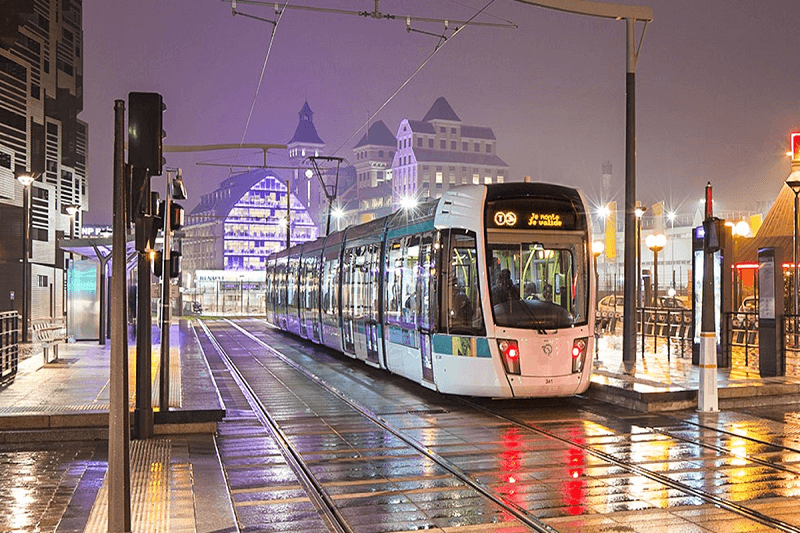
Clothing Costs in France
As the fashion capital of the world, France offers a wide range of options for clothing purchases.
Economic Living: Shopping at discount stores like Primark costs around €50 to €100 per month.
Average Living: Shopping from regular brands like Zara, Mango, and H&M costs between €200 and €400 per month.
Luxury Living: Shopping from luxury brands such as Chanel, Gucci, and Louis Vuitton costs between €1000 and €5000 per month.
Student Living: Clothing expenses vary depending on the brand and store, but seasonal sales offer more affordable options.
Ways to Reduce Clothing Costs
Shopping during seasonal sales to get lower prices.
Buying from second-hand stores and outlets.
Using discount codes and online sales.
Entertainment and Leisure Costs in France
France offers a wide variety of entertainment options including cinema, theater, concerts, sports, and tourism, all of which significantly impact living expenses.
Economic Living: Using public parks, student discounts for cinemas and museums, costs between €50 and €150 per month.
Average Living: Dining out a few times, going to the cinema, theater, and participating in sports activities costs between €200 and €500 per month.
Luxury Living: Attending exclusive events, using luxury services like spas, and joining expensive fitness clubs costs between €1000 and €3000 per month.
Student Living: Student entertainment expenses, such as cinema, restaurants, and outings, are estimated at around €100 to €200 per month.
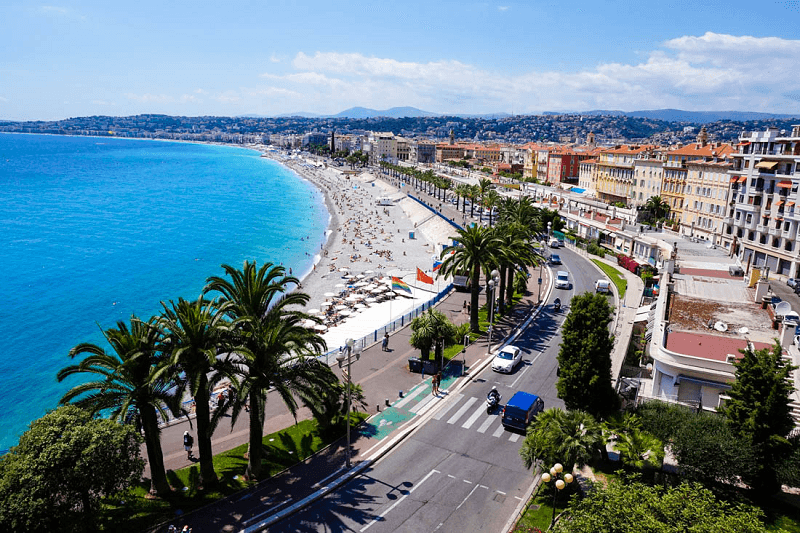
Ways to Reduce Entertainment Costs
Taking advantage of free cultural programs such as exhibitions and street concerts.
Using special student discounts and cultural membership cards.
Choosing low-cost activities like nature walks and visiting free city attractions.
Cost of Living Comparison in French Cities
The cost of living varies significantly across different cities in France. In this article, we take a closer look at the cost of living in some of the most important cities in the country.
Cost of Living in Paris, France
Paris, the capital of France, is considered one of the most expensive cities in the world. Living in this city can be particularly challenging for students and people with average incomes. Below are some of the major living costs in this city:
Housing Rent: Rental prices in Paris are very high. For example, renting a one-bedroom apartment in the city center can range from €1,500 to €2,500 per month. In the suburbs, this amount drops to around €1,000 to €1,500.
Food and Groceries: Grocery prices in Paris are higher than in other French cities. A meal at a regular restaurant costs around €15 to €25, while dining at a high-end restaurant may cost €50 or more.
Public Transportation: Paris has an extensive public transportation system that includes the metro, buses, and trams. A monthly pass for unlimited metro use costs about €86.
Entertainment and Leisure: A cinema ticket costs around €12, and a gym membership ranges from €30 to €70 per month.
Student Living Costs: The student cost of living is quite high, estimated at around €1,400 to €1,800 per month.

Cost of Living in Lyon, France
Lyon, the second-largest city in France, offers a more affordable cost of living compared to Paris, though it is still considered relatively expensive. The city is highly popular due to its rich culture, famous restaurants, and ideal geographic location.
Housing Rent: Renting a one-bedroom apartment in central Lyon ranges from €700 to €1,200, while in the suburbs it costs around €500 to €900.
Food and Restaurants: Food costs in Lyon are lower than in Paris. A meal at a cheap restaurant costs around €10 to €15, and at a mid-range restaurant between €20 and €40.
Public Transportation: Lyon’s public transport system includes metro, tram, and bus services. A monthly pass for unlimited access costs about €65.
Entertainment and Leisure: A cinema ticket in Lyon costs around €10, and gym memberships start from €30 per month.
Student Living Costs: Lyon is a popular city for students, with monthly living expenses estimated between €800 and €1,200.
Cost of Living in Marseille, France
Marseille, one of the largest cities in southern France, is very popular due to its coastal location and Mediterranean climate. Compared to Paris and Lyon, the cost of living in Marseille is more affordable.
Housing Rent: Renting a one-bedroom apartment in central Marseille ranges from €600 to €900, and in the suburbs from €400 to €700.
Food and Restaurants: Grocery costs in Marseille are lower than in Paris. A meal at a budget restaurant costs around €10 to €15, while at a mid-range restaurant it costs about €25 to €35.
Public Transportation: A monthly ticket for bus and metro access costs around €50.
Entertainment and Leisure: Entertainment costs in Marseille are lower than in larger French cities. Gym memberships range from €25 to €50 per month.
Student Living Costs: The cost of living for students in Marseille is relatively low, with average monthly expenses estimated between €700 and €1,100.
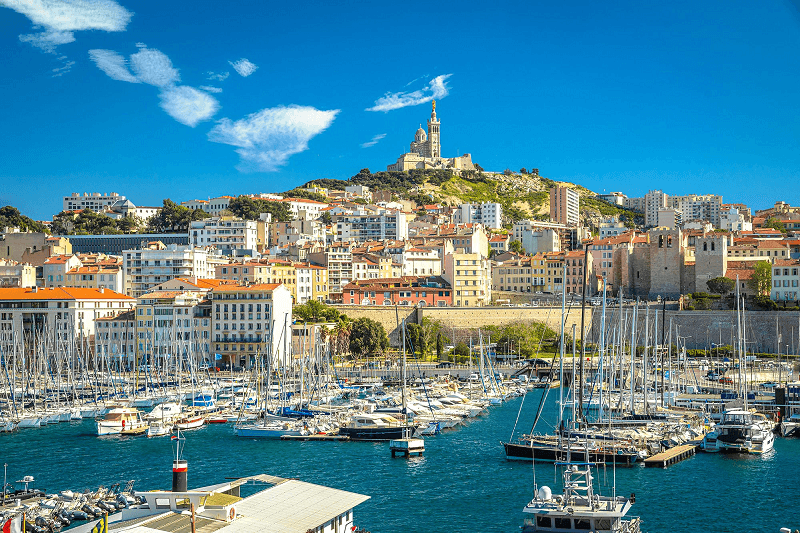
Cost of Living in Bordeaux, France
Bordeaux, one of the most beautiful and popular cities in France, is considered an excellent place to live due to its high quality of life and balanced living costs.
Housing Rent: Renting a one-bedroom apartment in the city center costs around €700 to €1,000, and in suburban areas about €500 to €800.
Food and Groceries: Food costs in Bordeaux are similar to those in Marseille. A meal at a regular restaurant costs around €10 to €20.
Public Transportation: Bordeaux’s public transport system includes trams and buses, with a monthly ticket costing around €50.
Entertainment and Leisure: A cinema ticket costs about €10, and gym memberships range from €30 to €50.
Student Living Costs: Student living expenses in Bordeaux average between €800 and €1,200 per month.
Cost of Living in Nice, France
Nice is one of the most famous tourist cities in France, and the cost of living in Nice, especially in coastal areas, is relatively high.
Housing Rent: Renting a one-bedroom apartment in central Nice costs around €800 to €1,500. In more distant areas, this amount can drop to €600 to €1,000.
Food and Restaurants: Food costs in Nice are higher compared to smaller French cities. A meal at a cheap restaurant costs around €12 to €20, while luxury dining exceeds €50.
Public Transportation: A monthly pass for buses and trams costs around €55.
Entertainment and Leisure: Due to the city’s touristic nature, entertainment costs are higher. Gym memberships range from €40 to €70 per month.
Student Living Costs: Nice is a more expensive city for students in southern France, with monthly living costs estimated between €900 and €1,300.
Cost of Living in Strasbourg, France
Strasbourg, one of the most important cities in France and the capital of the Alsace region, is located near the German border and blends French and German cultures. As one of the European Union’s key cities, living costs in Strasbourg are moderately high.
Housing Rent: Rent in Strasbourg is lower than in Paris but still relatively high. A one-bedroom apartment in the city center ranges from €750 to €1,200, and in suburban areas from €550 to €900.
Food and Restaurants: Grocery costs in Strasbourg follow the national average. A meal at a regular restaurant costs around €12 to €20, and at a mid-range restaurant between €30 and €50.
Public Transportation: A monthly ticket for buses, trams, and public bicycles costs around €50.
Entertainment and Leisure: Cinema tickets range from €10 to €12, and gym memberships cost around €30 to €60 per month.
Student Living Costs: Living expenses for students in Strasbourg are relatively affordable, estimated at €750 to €1,100 per month.
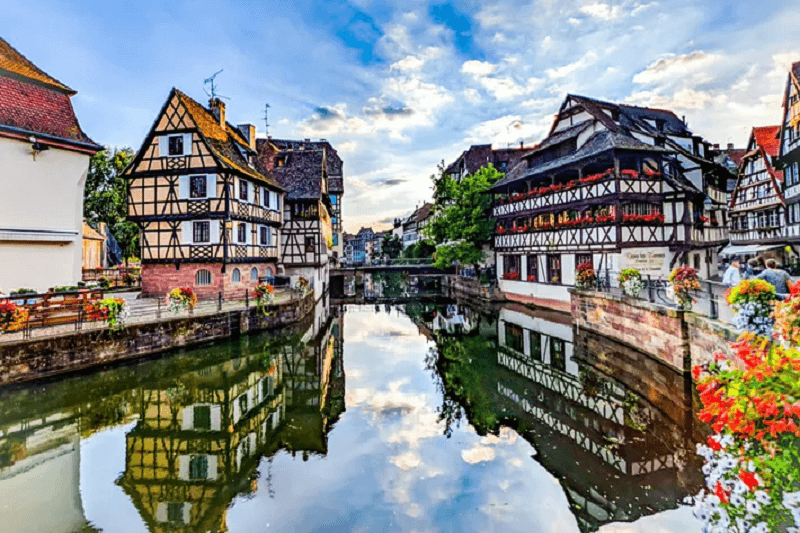
Cost of Living in Nancy, France
Nancy is a historic city in eastern France and the capital of the Lorraine region. Known for its beautiful architecture, reputable universities, and affordable cost of living—especially for students—Nancy is considered one of the cities with the lowest living expenses in France.
Housing Rent: Nancy is one of the most budget-friendly cities in France. Renting a one-bedroom apartment in the city center costs around €500 to €800, and in suburban areas about €400 to €650.
Food and Restaurants: Food costs in Nancy are lower than in larger French cities. A meal at a budget restaurant costs around €10 to €15, and at a mid-range restaurant between €20 and €35.
Public Transportation: A monthly ticket for buses and trams in Nancy costs around €40.
Entertainment and Leisure: A cinema ticket costs about €8 to €10, and gym memberships range from €20 to €40 per month.
Student Living Costs: Nancy is among the more affordable cities in France, with student living expenses typically ranging from €650 to €1,000 per month.
Cost of Living in Toulouse, France
Toulouse, the fourth-largest city in France, is one of Europe's main hubs for the aerospace and technology industries. With its pleasant climate, reputable universities, and high quality of life, Toulouse is one of the most popular cities in France to live in.
Housing Rent: Rental prices in Toulouse are lower than in Paris and Nice but still relatively high. A one-bedroom apartment in the city center ranges from €700 to €1,100, and in suburban areas from €550 to €850.
Food and Restaurants: Grocery costs in Toulouse are close to the national average. A meal at a cheap restaurant costs €12 to €20, and at a mid-range restaurant between €25 and €45.
Public Transportation: Toulouse has an efficient public transportation system including metro, buses, and trams. A monthly pass costs around €50.
Entertainment and Leisure: A cinema ticket ranges from €9 to €12, and gym memberships cost about €30 to €60 per month.
Student Living Costs: The cost of student living in Toulouse is moderate, averaging between €750 and €1,100 per month.
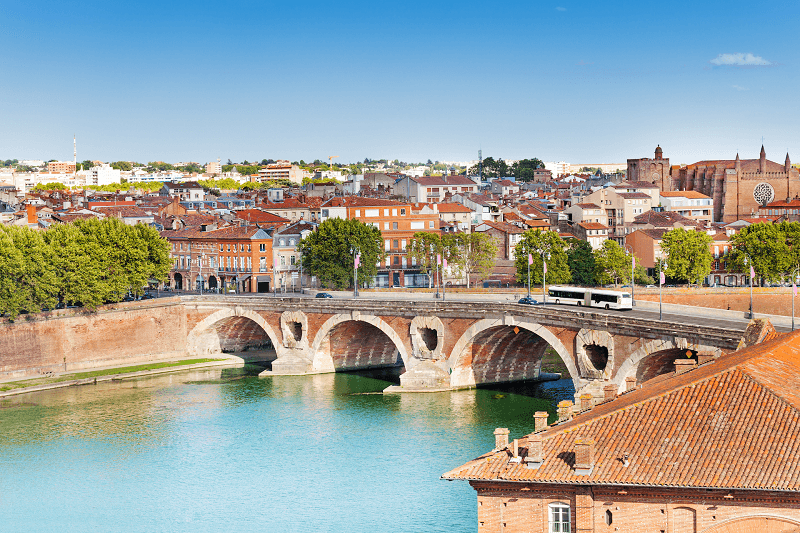
Overall Comparison of Living Costs in French Cities
If you plan to live in France, you should choose a city that fits your budget and lifestyle. A general comparison of the cost of living in France reveals the following:
More Expensive Cities:
Paris: The most expensive city in France with very high rent and daily living costs.
Nice: Expensive, especially in coastal areas, but offers a high quality of life.
Cities with Moderate Costs:
Lyon: More affordable than Paris but still relatively high.
Bordeaux: Excellent quality of life with average living costs.
Strasbourg: Close to Germany, good job opportunities, moderate expenses.
Toulouse: A student and industrial city with fairly reasonable costs.
More Affordable Cities:
Marseille: Cheaper housing and overall lower living expenses than major cities.
Nancy: One of the most affordable cities in France, ideal for students.
Conclusion
Living in France can vary greatly in cost depending on lifestyle, location, and individual habits. Paris, as the most expensive city, has high costs in housing, food, and transportation, while smaller cities like Lille and Nantes offer more budget-friendly options.
However, strategies like shared housing, shopping at discount stores, and using public transportation can help reduce the cost of living in France. Ultimately, with careful planning and awareness of the living costs in different cities—such as the cost of living in Lyon, Strasbourg, and more—you can enjoy a balanced and high-quality life in France.
Frequently Asked Questions (FAQs)
What is the minimum cost of living in France?
The minimum monthly cost of living for a single person is approximately €1,200 to €1,800.
Which city in France is cheaper to live in?
Cities like Lille and Nantes have lower living costs compared to Paris.
Is student life in France expensive?
Yes, but using student dormitories and special discounts can help reduce expenses
What’s the best way to reduce housing costs?
Living in shared housing or choosing smaller cities can help lower housing costs.


